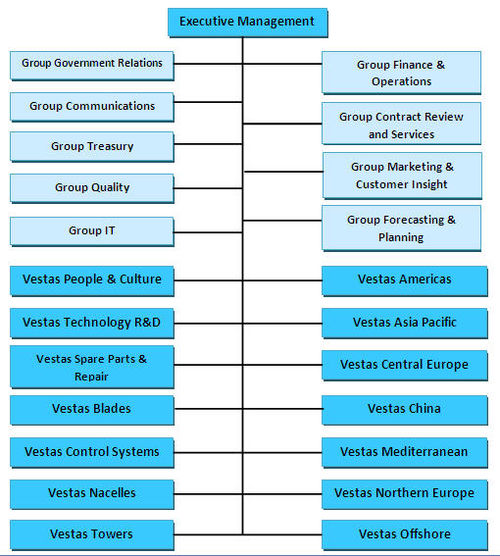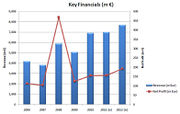Vestas Wind Systems A/S
Overview
Vestas Wind Systems A/S engages in the development, manufacture, sale, and maintenance of wind technology that uses the energy of the wind to generate electricity. It offers wind turbines and wind power systems. The company also provides planning, installation, operation, and maintenance services. Vestas Wind Systems A/S has a strategic partnership with Marafeq to develop wind energy projects in Syria. It operates in Europe, the Americas, and the Asia Pacific. The company was founded in 1898 and is headquartered in Randers, Denmark.
Revenues for the year 2010 rose 36%, to €6.9 billion, from nearly €5 billion in 2009, the company said. It expects revenues to hit €7 billion in 2011. Net profit rose 25% to about €156 million, up from about €125 million in 2009.
Vestas delivered 5,842 megawatts worth of wind turbines in 2010, compared to 4,764 megawatts delivered in 2009, the company said. The Global Wind Energy Council, based in Brussels, Belgium, said new wind turbine installations dropped to 35.8 gigawatts in 2010, from 38.6 gigawatts in 2009. Based on Vestas’ reported deliveries, the company’s world-wide marketshare rose to 16 percent in 2010, from 12 percent the previous year.
Source: Corporate Information, Businessweek, Denver Bizjournals
Business Overview
Vestas Wind Systems A/S engages in the development, manufacture, sale, and maintenance of wind technology that uses the energy of the wind to generate electricity. It offers wind turbines and wind power systems. The company also provides planning, installation, operation, and maintenance services. Vestas Wind Systems A/S has a strategic partnership with Marafeq to develop wind energy projects in Syria. It operates in Europe, the Americas, and the Asia Pacific. The company was founded in 1898 and is headquartered in Randers, Denmark. Its product range includes land and offshore wind turbines capable of generating between 850 kilowatts and 3 megawatts as well as supervisory control and data acquisition (SCADA) products, supplying a range of monitoring and control functions, allowing the wind power plants to be remotely supervised. The Company is operational internationally through a network of subsidiaries.
To date, Vestas has installed over 41,400 wind turbines in around 70 countries on five continents. Along with this vast experience, the company has predicted that by 2020 as much as 10 per cent of the world’s electricity consumption will be generated by wind energy.
Key Financials
Key Facts
| Headquarter | Vestas Wind Systems A/S Alsvej 21 8940 Randers SV Denmark |
| Phone | (+45) 97 30 00 00 |
| Fax | (+45) 97 30 00 01 |
| vestas@vestas.com | |
| Website | http://www.vestas.com/ |
| Turnover (in million €) | 6,920 |
| Financial Year End | December |
| Number of employees | 23,252 |
Source: Corporate Information, Businessweek, NGU Summit, Vestas Financial Reports
Company Overview
Brief History
The following table provides a brief history of the developments of Vestas Wind Systems, starting from its inception in 1898.
| Timeline | Development |
| 1898 | Vestas founded by H.S. Hansen, a blacksmith, in the small town of Lem in Denmark. He and his son, Peder Hansen, manufactured steel windows for industrial buildings. |
| 1945 | Peder Hansen established the company VEstjyskSTålteknik A/S, whose name was shortened to Vestas. The new company, which initially made household appliances, started to produce agricultural equipment. |
| 1970s | During the second oil crisis, Vestas began to examine the potential of the wind turbine as an alternative source of clean energy. |
| 1979 | Vestas delivered the first wind turbines. The industry experienced a genuine boom at the start of the 1980s, but in 1986 Vestas was forced to suspend payments because the market in the United States was destroyed due to the expiration of a special tax legislation that provided advantageous conditions for the establishment of wind turbines. |
| 1986 | Large sections of Vestas were sold off and a new company called Vestas Wind Systems A/S was founded at the end of the year to concentrate exclusively on wind energy. |
| 1987 onwards | Vestas develops from a pioneer in the industry with a staff of around 60 people to become a global hi-tech and market-leading company employing more than 20,000 people. |
| 2004 | Vestas merged with another Danish wind turbine manufacturer, NEG Micon A/S. |
| 2005 | Ditlev Engel becomes President and CEO of the company. Less than a month after taking up his new position, he published his strategy for Vestas for 2005-2008: The Will to Win. This includes, among other things, a new vision for Vestas. This vision is Wind, Oil and Gas, stating that wind power is to be a source of energy on par with oil and gas. |
| 2007 | To strengthen our market leading position and to stress the fact that wind is an energy source on par with oil and gas, Vestas launched the new strategy: No. 1 in Modern Energy. At that time, Vestas had installed more than 33,500 wind turbines in 63 countries and on 5 continents. |
| 2010 | Vestas emphasized their intention with their new slogan - WIND, IT MEANS THE WORLD TO US. With more than 41,000 turbines installed and 30 years of pure-play experience, the company predicted 10% of electricity by wind by 2020. Vestas takes pride in the unmatched diversity of capability and skills residing in more than 20,000 people worldwide, on one pure goal: generating the greatest and most sustainable return on wind for the customers. |
Source: Vestas History
Company Structure
- Vestas has 14 business units, all reporting directly to the Executive Management.
- The presidents of the individual business units are responsible for the general day-to-day management of their respective areas of responsibility.
- Each unit has a Board of directors that holds meetings at least four times a year. Vestas’ Executive Management is a member of the business units’ Boards, thus ensuring close dialogue with the individual units.
- The Government coordinates production and sales – and prioritises development efforts so that the Group can implement the strategy defined by the Board of Directors in collaboration with the Executive Management. The Vestas Government holds weekly government meetings.
A schematic representation of the company structure is given below:

To view the details of an individual business unit, please click on the business unit name:
Employee Distribution
- Vestas recruit employees under the “People before megawatt” principle, because the costs of well-educated excess capacity are lower than the costs of remedying faults due to a rushed staff inflow caused by strong MW growth.
- The 23,252 employees have an average seniority of 3 years and 11 months.
- Key priority areas identified are training and, in particular, retention of new and existing employees as around 22% of the employees are having less than one year's seniority.
- Due to enhanced efficiency, improved turbine performance and economies of scale, going forward, Vestas expects its headcount to rise at a lower rate than its business volume.
- A prerequisite for sustaining progress is for Vestas to become a more international business with a much higher number of non-Danish employees in management positions. Furthermore, Vestas aims to have more women executives.
- In addition, Vestas also aims to have many nationalities at all locations in order to create a truly global business, which also has extensive local insight and understanding.
The following table provides the employee distribution of Vestas across geographies:
| Region/Department | Production | Sales | R&D | Others | Total |
| Europe & Africa | 7,579 | 4,509 | 1,515 | 1,522 | 15,125 |
| Americas | 1,479 | 1,278 | 189 | 0 | 2,946 |
| Asia-Pacific | 2,475 | 2,004 | 573 | 129 | 5,181 |
| Total | 11,533 | 7,791 | 2,277 | 1,651 | 23,252 |
A comparative graph of emplyee distribution by function for 2006 and 2010 is given below:

Revenue Distribution
The following table gives the geopraphical break-up of revenue distribution for the year 2010:
| Geography | Revenue (m Eur) | % of Total Revenue |
| Europe & Africa | 4,162 | 60% |
| Americas | 1,626 | 23% |
| Asia Pacific | 1,132 | 16% |
| Total | 6,920 | 100% |
Source: Vestas Financial Reports
